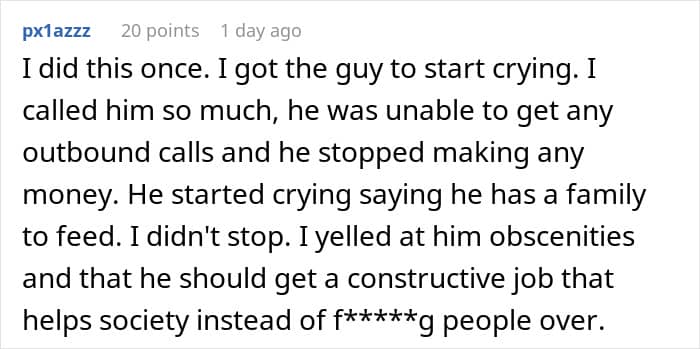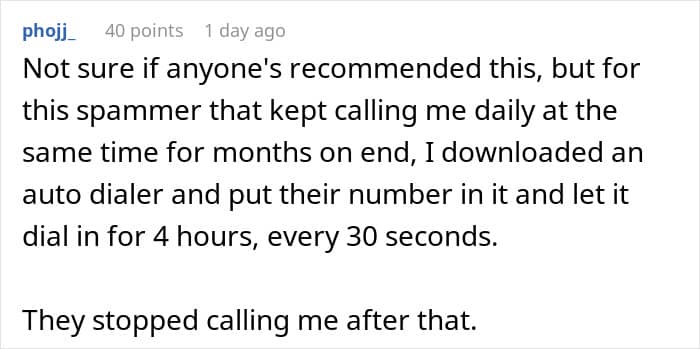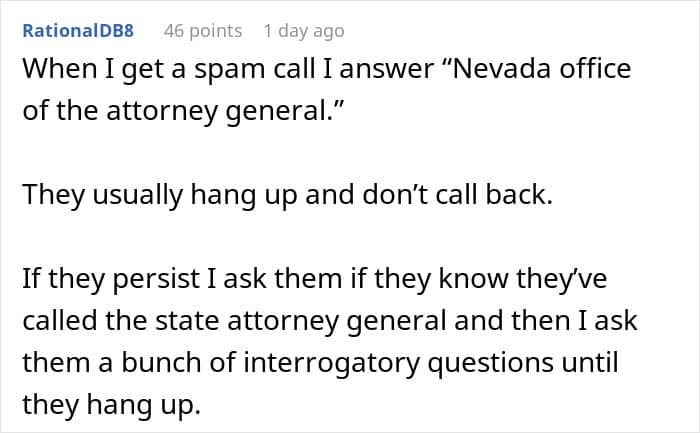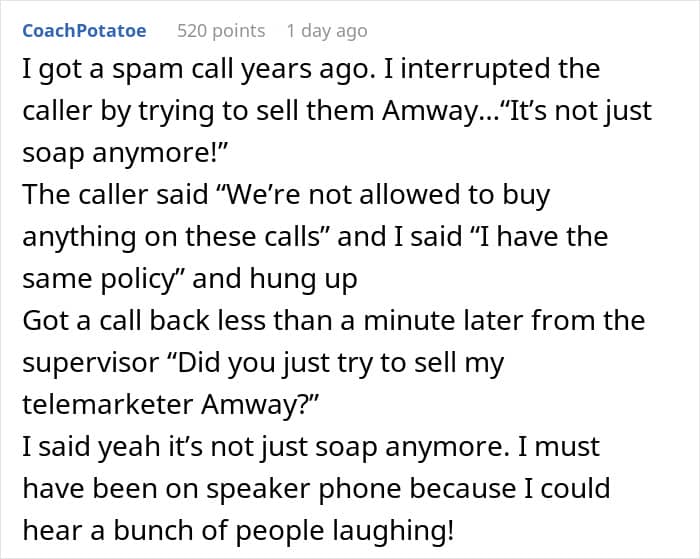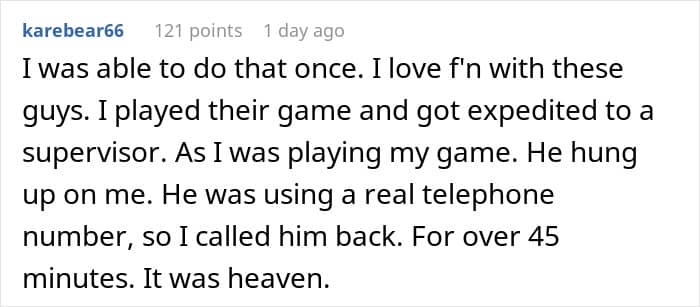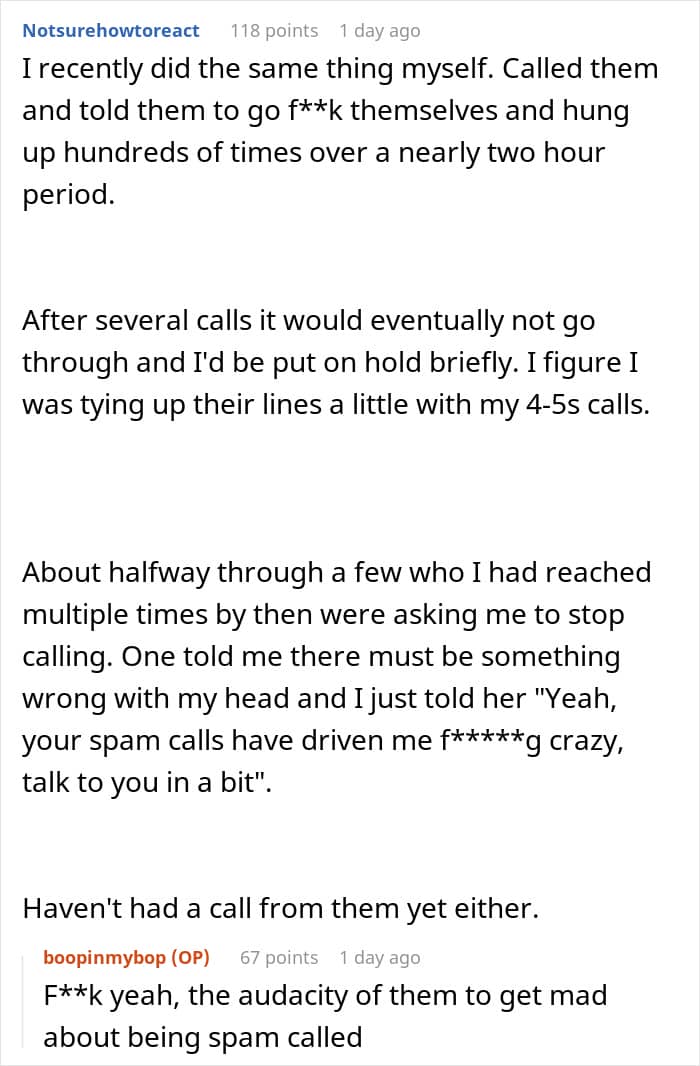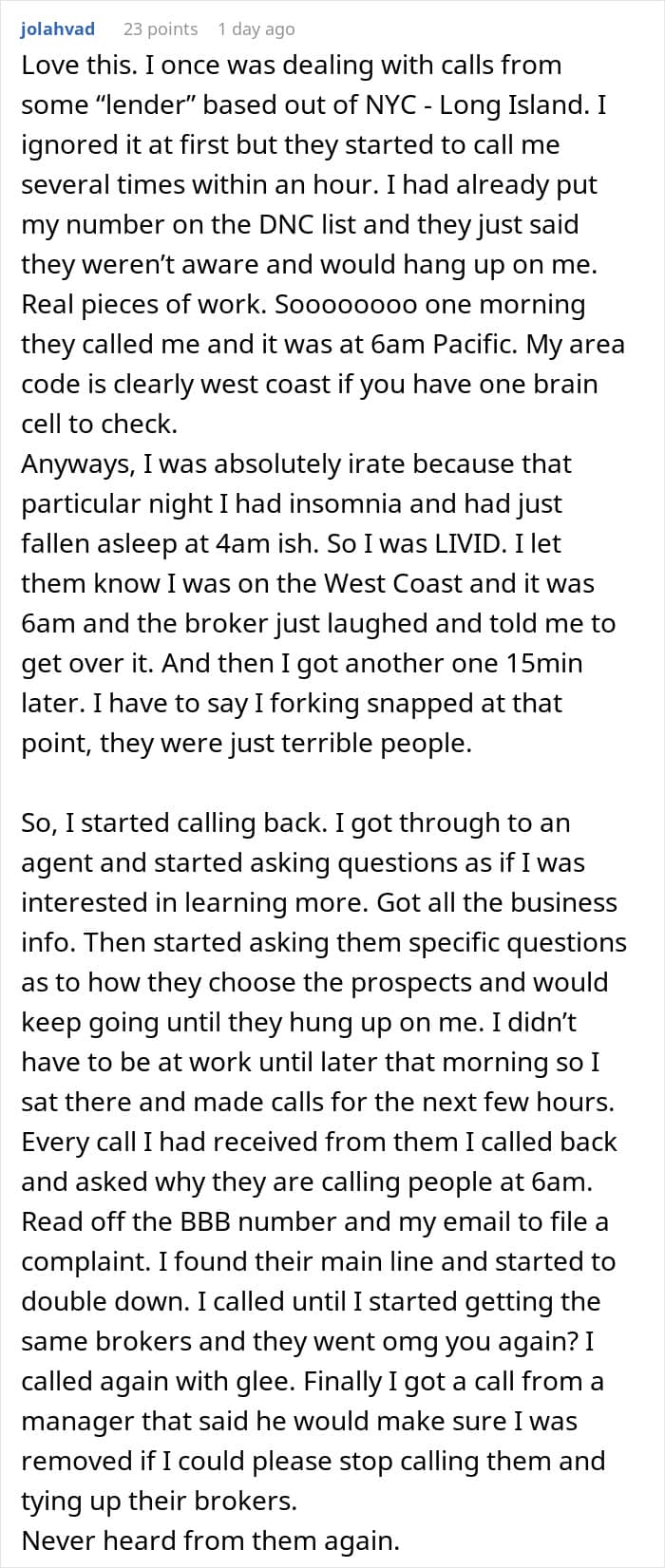“Hi there. We’ve been trying to reach you to discuss your car’s extended warranty.” Now, anyone who has ever heard that message on their cell phone most likely hung up immediately, blocked the number and hoped that they wouldn’t have to hear it again any time soon.
Spam calls are an epidemic, and it can be extremely frustrating trying to eradicate them from your call log. So after being harassed for an entire year, one man finally decided to take matters into his own hands and call the company back. Below, you’ll find the full story of petty revenge that was recently posted on Reddit, as well as conversations with the post’s author and Anne Cutler, Cybersecurity Expert at Keeper Security.
RELATED:Being bombarded by spam calls can be incredibly frustrating

So this man decided to give his dedicated spammers a taste of their own medicine
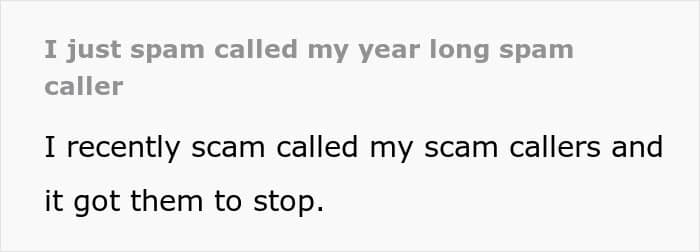
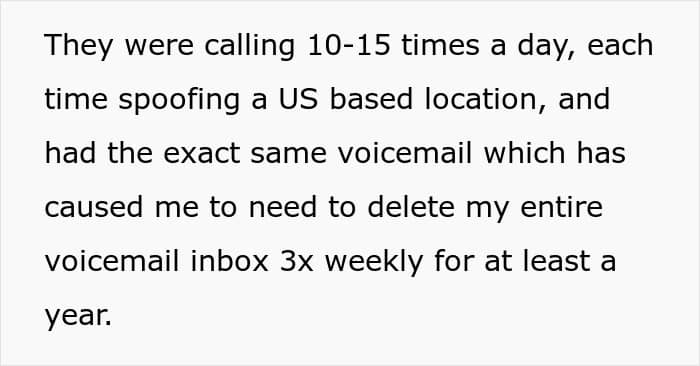
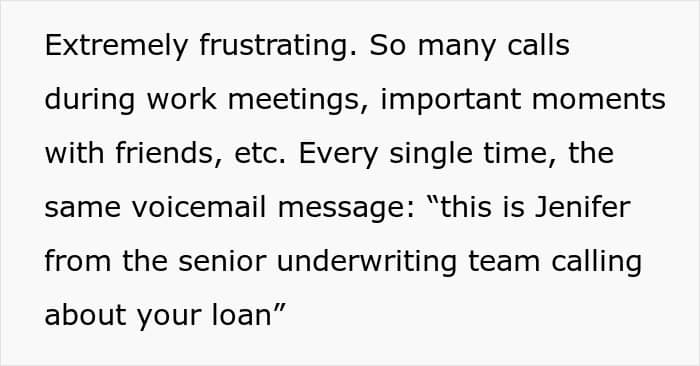
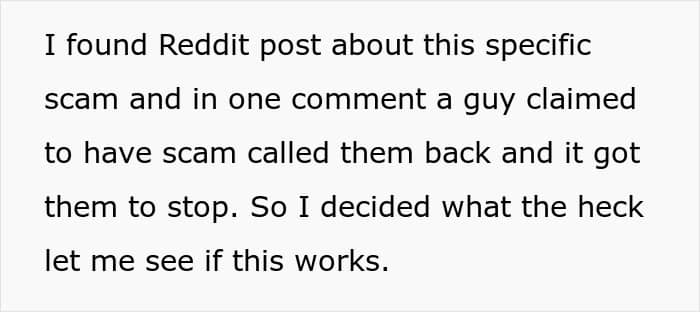
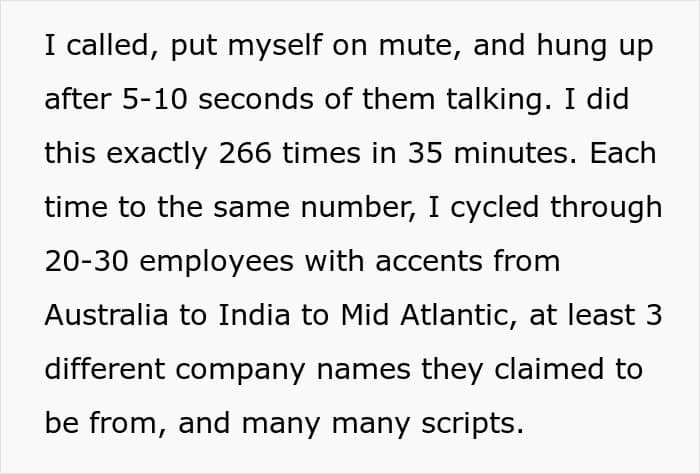


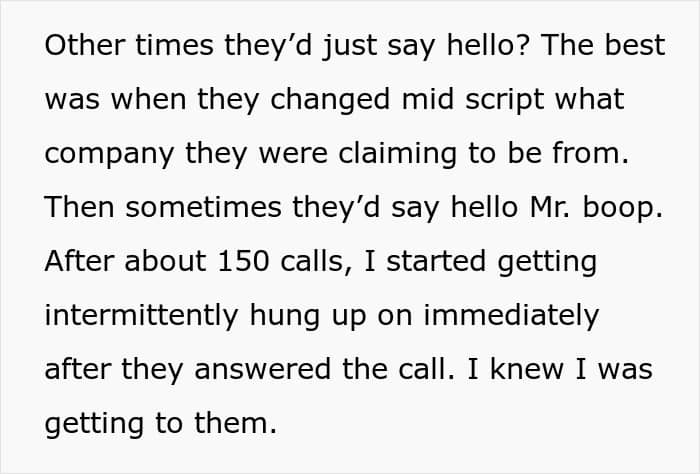




“Our government should’ve figured out legislation to stop this nonsense at least a decade ago”

To find out more about this situation, we got in touch with the post’s author, Reddit user Boopinmybop. First, we wanted to know what inspired him to share this story.
“I thought people would find the story funny, and hopefully relate to my experience of getting so many spam calls every day,” he told We. “I original wrote it down as a comment but realized the story was kind of hilarious with the final boss coming on and all, so I actually used the Reddit answers feature and asked it which subreddit would fit the story best.”
Thankfully, the author added that he still hasn’t received any more calls.
As for when these aggressive calls started, Boopinmybop says they began about a year ago. “Maybe January of 2024. I had just gone into a credit card debt relief program, and I think that’s when my number must’ve gotten shared,” he noted. “It started out like any other scam call, just got a few a week maybe. But by the time of the presidential election, the frequency began to increase. 4, 5, 6 calls a day.”
“It subsided to only 2-3 calls a day right after the election but got worse again this January when it reached, I’m not even kidding, sometimes 15 calls a day from them,” the author continued. “I’m a PhD candidate, so I’m constantly either in meetings giving presentations, or running sensitive experiments. And boy, getting those calls was incredibly disruptive.”
“So my tactic had been to: send the call to voicemail, followed by blocking the caller,” Boopinmybop revealed. “But this never stopped them from happening. The next day I’d just get called by more numbers. They were always spoofed to a US city or town, like Oyster Bay, NY, or Louisville, KY. There’s plenty others.”
“And with this method, my voicemail box was filling up 2-3 a week minimum, so I’d have to go in and manually delete each one,” the author shared. “I can only imagine I’ve missed some important calls from my doctor at some point (I’m chronically ill). I did at one point ask to be put on a ‘Do Not Call’ list, but that also never helped. That was in the fall around the election time.”
So would he recommend that other people take the same route when dealing with spam callers? “If anyone has a spare 30-60 minutes and really wants their spam caller to quit it, I’m not sure there’s a better way at this moment,” Boopinmybop says. “Blocking never worked, and their ‘Do Not Call’ list doesn’t actually exist. It’s annoying, but they deserve it for [messing] with people’s day to day so heavily. Also I can only imagine they’ve done financial damage to older or more vulnerable folks who fell for their scam.”
Finally, we asked the OP what he thought of the responses to his post. “Replies have been amazing,” he shared. “Glad to hear other people have had similar experiences, and that other people have gotten their spam calls to stop. To be honest, it’s 2025, and our government should’ve figured out legislation to stop this nonsense at least a decade ago. So I’m glad I could make a space on the internet where folks affected by spam calls could discuss their own situations.”
Spam calls aren’t just annoying, they can also be dangerous

To learn more about spam calls, we also got in touch with Anne Cutler, Cybersecurity Expert at Keeper Security. She was kind enough to have a chat with We and discuss what the point of these calls is in the first place.
“Spam calls are typically unsolicited communications initiated by businesses or bad actors, often with the intent to promote or sell products and services,” the expert shared. “However, the motives behind these calls can vary significantly. In the more benign cases, legitimate businesses use them for marketing purposes.”
“The more concerning variant comes in the form of scam calls, where cybercriminals impersonate trusted entities like banks or government agencies,” Anne continued. “These individuals aim to deceive recipients into revealing sensitive information or making fraudulent payments.”
“For cybercriminals, spam calls are a low-cost, high-volume strategy to identify active phone numbers, manipulate people through emotional tactics and ultimately extract value – whether financial or in the form of information – from unsuspecting targets,” she warns.
Anne also says that answering one of these calls may seem harmless, but it can have serious consequences. “The very act of answering confirms to the caller that your phone number is active, which can make you a recurring target for future spam and scam attempts,” she noted.
“More alarmingly, some scammers may record your voice and use it in vishing or voice phishing attacks, where they impersonate your voice. There is also the risk of being emotionally manipulated,” the expert shared. “Scammers may fabricate urgent situations like compromised accounts or legal threats to pressure you into sharing personal or financial information.”
“In worst-case scenarios, this can lead to identity theft, financial loss and ongoing exposure to more sophisticated scams,” Anne added.
To help mitigate these risks, some choose to invest in identity theft insurance, which can offer financial and recovery support if their information is compromised.
“Protecting yourself begins with minimizing engagement”

So how can we protect ourselves from these dangerous calls? “Protecting yourself begins with minimizing engagement. It is strongly advised not to answer calls from unknown numbers; legitimate callers will usually leave a voicemail or follow up through other channels,” the security expert says.
“Additionally, many smartphones and providers offer features that flag suspicious calls with labels like ‘Spam Likely.’ Installing third-party spam-filtering apps can provide another layer of defense,” Anne continued. “Blocking and reporting numbers that are known to be spam-related helps not only you, but others as well.”
“Another effective step is registering your number with the national Do Not Call Registry, which reduces exposure to telemarketing and makes malicious calls more identifiable,” she recommends. “If a call does slip through, hang up immediately and avoid sharing any personal details.”
Finally, Anne says awareness and vigilance are our best defenses against spam and scam calls. “While answering a spam call doesn’t immediately compromise your data, it opens the door to further targeting,” she points out. “Recognizing red flags – such as pre-recorded messages, caller ID spoofing, urgency and requests for personal or financial data – is critical.”
“As cybercriminal tactics become more sophisticated, it’s important to stay informed and use technology tools to your advantage. Always remember: if something feels off, it probably is,” the expert added. “Erring on the side of caution can help protect your privacy and security in the long run.”
We would love to hear your thoughts on this situation in the comments below, pandas. How do you think this man handled the harassment he had been receiving from spam callers? Then, if you’re interested in checking out another We article discussing a similar topic, look no further than right here!
Later, the author replied to a couple of comments and provided some more information
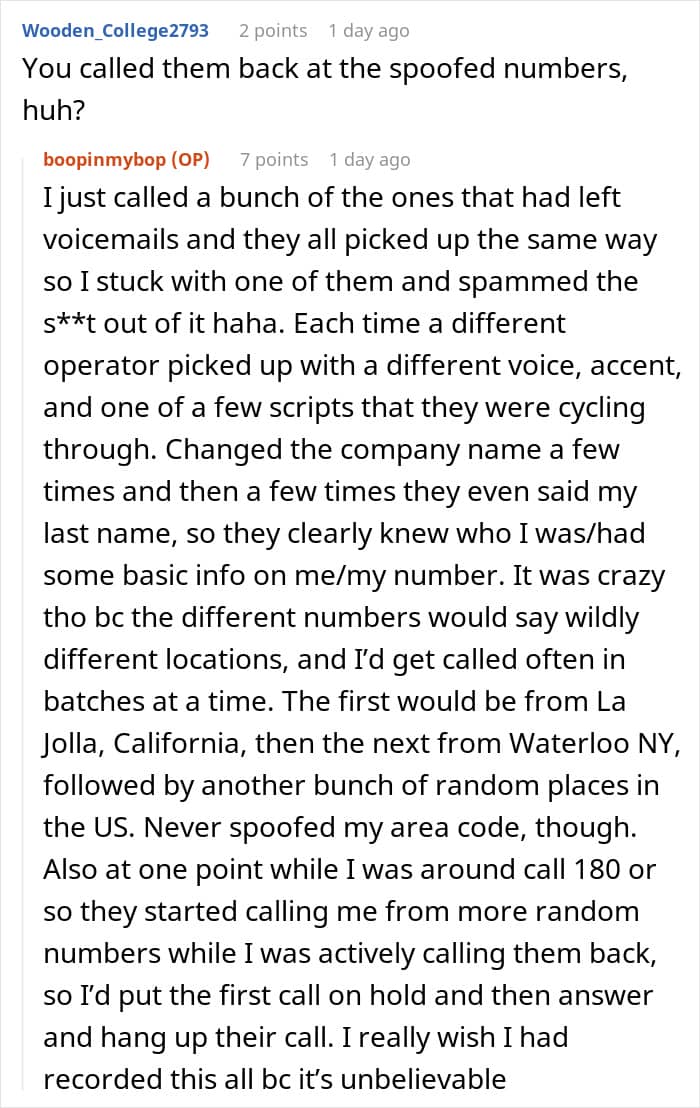
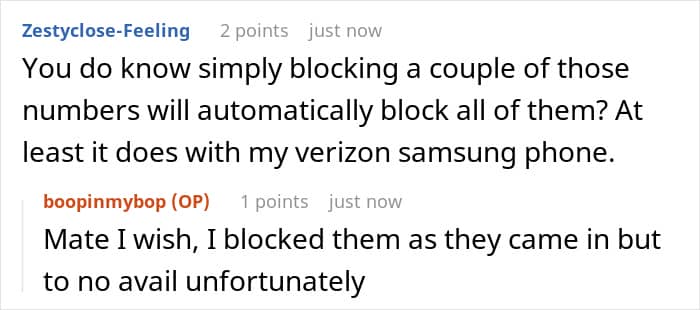
Many readers applauded the man for his petty revenge
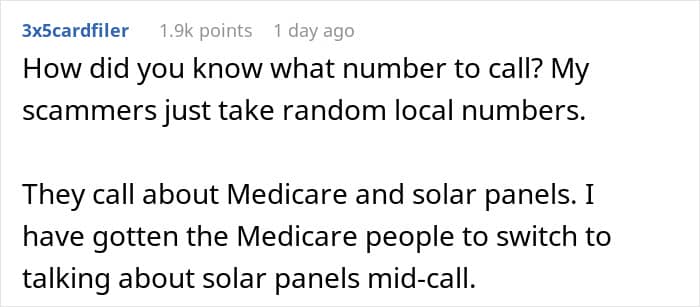


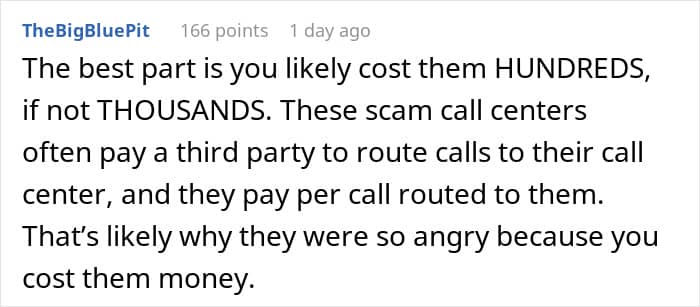



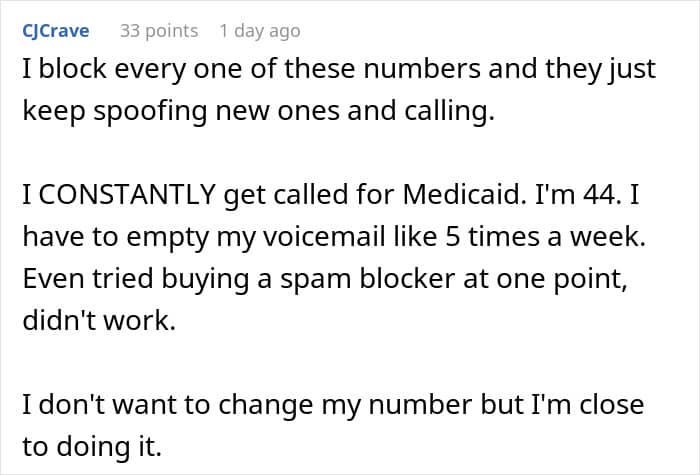


Some even shared stories of their own experiences with spam callers
